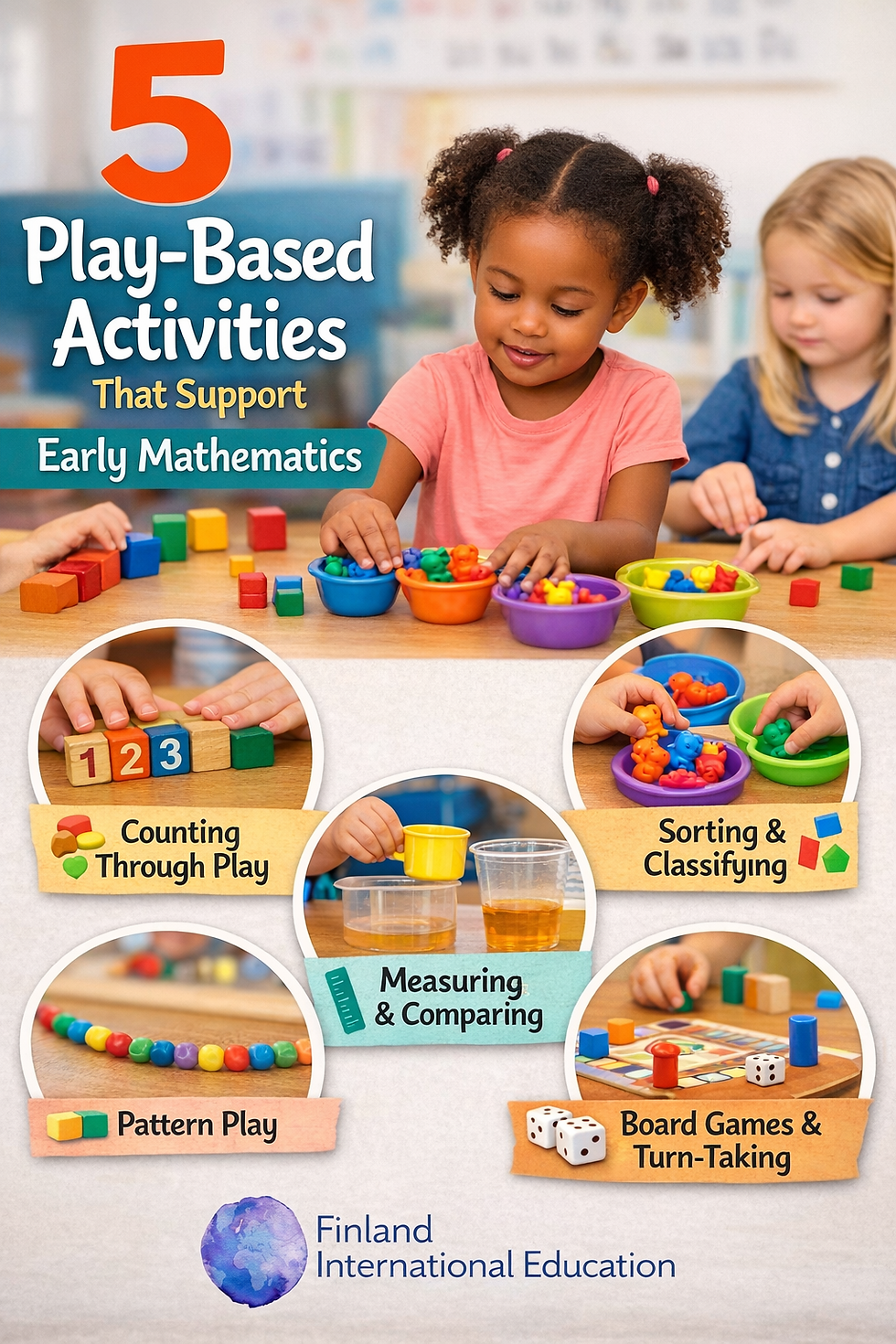Finnish Early Childhood Education: Nurturing Lifelong Success
- FINE
- Jul 30, 2023
- 3 min read
Updated: Aug 30, 2025
Introduction
Finnish early childhood education (ECE) has gained worldwide acclaim for its holistic approach, child-centric philosophy, and exceptional outcomes. Finland's education system is renowned for consistently producing high-performing students and fostering a love for learning from an early age. In this blog, we will delve into the key aspects of Finnish ECE and explore the profound benefits it brings to both children and adults.
1. The Foundation of Finnish Early Childhood Education
At the heart of Finnish ECE lies a commitment to providing an enriching and supportive environment for young learners. The approach is based on principles of equity, inclusivity, and individuality. Children are viewed as competent individuals with natural curiosity, and the education system respects their unique learning styles and interests.
2. Play-Based Learning and Creativity
One of the cornerstones of Finnish ECE is play-based learning. Children engage in unstructured play that promotes imagination, problem-solving, and social skills. By fostering creativity and curiosity, Finnish ECE allows children to discover their passions and interests, laying a strong foundation for future academic success.
3. Emphasis on Social Development
Finnish ECE places significant importance on social interaction and emotional development. Children are encouraged to collaborate, communicate, and empathize with their peers. Through group activities and play, they learn essential life skills, such as teamwork, conflict resolution, and self-regulation, which are vital for personal and professional growth in adulthood.
4. Minimal Formal Academics
Unlike some education systems that prioritize early formal academics, Finnish ECE adopts a more relaxed approach. There is no pressure to learn to read or write at a young age. Instead, the focus is on fostering a love for learning and allowing children to explore their interests naturally. This approach has been found to create a solid educational foundation and reduce the risk of burnout in later years.
5. Qualified and Respected Educators
Finnish ECE teachers are highly trained professionals who are regarded with the utmost respect. They undergo rigorous training in child development, pedagogy, and play-based learning methodologies. This level of expertise enables them to cater to each child's individual needs and adapt their teaching strategies accordingly.
6. Parent Involvement and Collaboration
Finnish ECE emphasizes a strong partnership between educators and parents. Parents are encouraged to actively participate in their child's learning journey. Regular communication and collaboration between parents and teachers create a supportive network that nurtures the child's holistic development.
7. Outdoor Learning and Connection with Nature
Finland's natural environment plays a significant role in its ECE philosophy. Children are encouraged to spend ample time outdoors, regardless of weather conditions. Outdoor activities promote physical health, curiosity, and an appreciation for nature. This practice has also been linked to improved cognitive function and enhanced creativity in children.
8. Equal Access to Education
Finland's commitment to equity in education is reflected in its ECE system. Every child, regardless of socioeconomic background or ability, has the right to high-quality education. This ensures that all children start their educational journey on an equal footing, promoting social cohesion and reducing achievement gaps.
Benefits for Children:
a. Enhanced Social Skills: Finnish ECE's focus on social interaction helps children develop strong interpersonal skills, fostering positive relationships throughout their lives.
b. Love for Learning: By promoting curiosity and exploration, Finnish ECE instills a love for learning that remains with children as they progress through their education.
c. Improved Cognitive Abilities: Play-based learning stimulates cognitive development, enhancing problem-solving, critical thinking, and creativity in children.

Benefits for Adults:
a. A Well-Rounded Workforce: Adults who experienced Finnish ECE tend to be adaptable, innovative, and collaborative employees, attributes highly valued in the modern workforce.
b. Parenting Skills: The collaborative approach between parents and educators in Finnish ECE equips parents with effective parenting strategies and deepens their understanding of child development.

Conclusion
Finnish early childhood education is a shining example of a child-centric and holistic approach that benefits both children and adults alike. By nurturing creativity, social skills, and a love for learning, Finnish ECE sets children on a path of lifelong success. Moreover, the positive outcomes of this exceptional education system extend into adulthood, shaping well-rounded individuals who contribute meaningfully to society. As the world continues to seek innovative education models, the Finnish approach serves as an inspiring and effective blueprint for early childhood education worldwide.
Please contact us for further discussion. Meet the FINE team: info@fineducation.fi




Comments